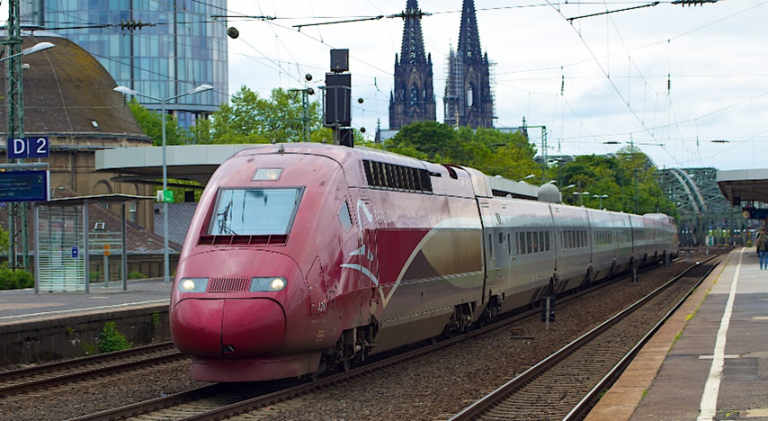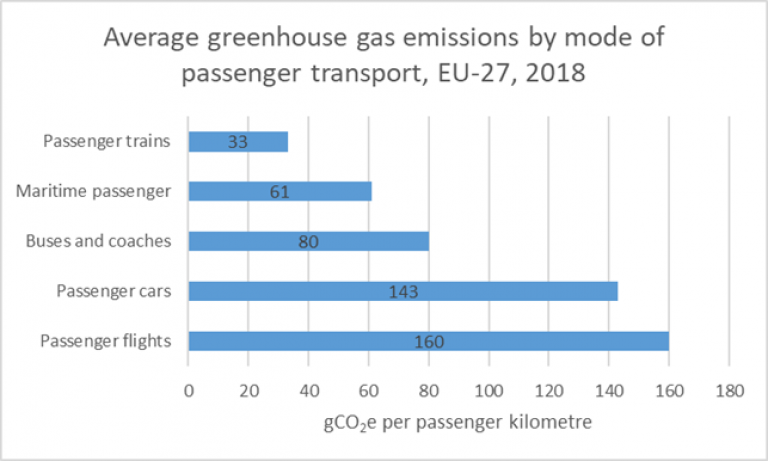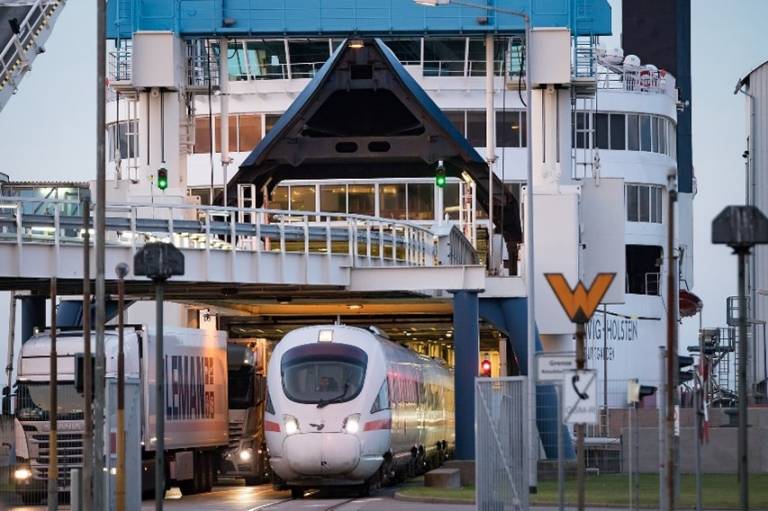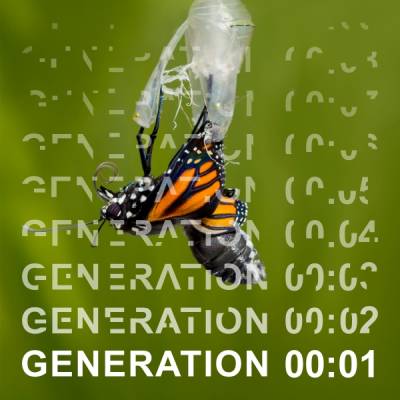"The one less traveled by": Reducing emissions from transport
16 January 2023
Individual choices to use trains instead of planes where possible can help us mitigate the effects of climate change – and can be a more pleasant way to travel, according to one advocate at UCL.

An inter-city train arriving at Köln in front of the city’s famous cathedral. Credit: Wikimedia
“Two roads diverged in a wood, and I—
I took the one less traveled by,
And that has made all the difference.
Robert Frost, “The Road Not Taken”
Must we wait for global solutions?
By Nick Hughes, Bartlett Faculty Lead for Climate Action
In November 2022, world leaders and their delegations assembled in Sharm el-Sheikh for COP27 – the 27th conference of the parties to the UN Framework Convention on Climate Change. The headline-grabbing outcome from the event was an agreement to set up a ‘loss and damage’ fund, in recognition of the impacts of climate change experienced by developing countries. But the meeting yielded much less in the way of new tangible commitments to halt the greenhouse gas emissions that are causing climate change.
The conference’s ‘cover decision’, dubbed the Sharm el-Sheikh Implementation Plan, restated the 2015 Paris Agreement’s language on “pursuing efforts” to limit temperature increase to 1.5 °C. But many delegations were dissatisfied that the Sharm el-Sheikh plan makes no explicit reference to phasing down all fossil fuels, or to the need for the growth in global greenhouse gas emissions to be halted, and for a rapid decline in emissions to begin immediately.
In 2012, Elinor Ostrom wrote a paper, the subtitle of which continues to resonate on at least an annual basis, with every new international environmental summit that fails to live up to expectations: “Must we wait for global solutions to climate change before taking actions at other scales?” Her answer expounds the importance of action at multiple scales – what she calls ‘polycentric’ governance. “Building a global regime is a necessity,” Ostrom affirms; but on its own it is “not sufficient”. Rather, Ostrom argues that this global regime will be strengthened by action at other levels, including action undertaken by individuals and by small or medium-sized organisations or governance institutions: “Building a polycentric system starts the process of reducing greenhouse gas emissions and acts as a spur to national and international regimes to get their act together!”
Ostrom’s concept of polycentric governance is an important source of inspiration for The Bartlett and UCL’s targets of reaching net-zero emissions by 2030. By committing to move forward with ambitious action on our own emissions, we hope to play a small part in helping to bring about the polycentric system that Ostrom envisages. In The Bartlett Review 2022, I have written about our first year’s activities in pursuit of our target. We have laid some important groundwork in this first year, but there is still a long way to go.
Making lower-carbon transport choices
Over the coming months we are going to be focussing particularly on reducing the emissions from the travel that we undertake as part of our work as a faculty. One important action we can take to reduce the carbon emissions from our travel is to select, wherever possible, the lowest carbon form of transport.
Notwithstanding some uncertainties dependent on assumptions in specific cases, it is possible to establish, with reasonable reliability, a carbon hierarchy of transportation modes, as illustrated in the figure below. Travel by private car and by plane is at the higher-carbon end of the scale, with train and boat at the lower end. In almost all cases, choosing to travel by train instead of by plane will deliver a substantial carbon saving. The carbon footprint of electric trains will reduce even further, as the electricity grid itself decarbonises.

Average greenhouse gas emissions by mode of passenger transport in the EU27, 2018. Data calculated by Fraunhofer ISI and CE Delft, published by European Environment Agency.
Travelling from London by train is easy to most parts of Britain, and to the destinations directly served by Eurostar. But what is it like to make the shift from air to rail for further flung European destinations? To find out more about travelling in Europe without clocking up air miles, I spoke to an expert – my friend and colleague Dr James Price.
Back in 2010 James decided to try and stop flying. “I don’t want to fly,” he told me. “I am quite committed to that. If I had to fly it's not the end of the world, but so far I haven't flown for about 12 years or so.”
In that time James has travelled to a range of European destinations, including Cork, Utrecht, Potsdam, Berlin, Lisbon and Gothenburg, without setting foot in an airport. “Gothenburg was probably the furthest and the most awkward. On that particular journey I went by train to Hamburg, stayed the night in a hotel, got up the next day, and finished my journey up to Gothenburg. That's the only one I've done so far that required an overnight stop.”
How do you go about planning a trip like that?
“Whenever I'm planning a journey,” James explained, “I always start by looking at The Man In Seat 61. He's a legend.” This piece of advice seemed at best cryptic, and at worst liable to lead to arrest for stalking – but James patiently clarified that the eponymous self-styled sedentary scribe is a rail travel enthusiast, whose website, which describes how to travel by train and ship in the UK, Europe and worldwide, is perhaps the definitive example of the hobby that got out of hand. “It's just got all the kind of information that you would want,” James enthused. “It's got different options for the same journey, so you can explore different routes, and also it will recommend how to book."
Thanks to the panoply of options supplied by his online pal, James’ plane-free odysseys have also been angst-free: “My experience has been it's relatively easy. I often joke that I'm a bit of a train geek. I get quite excited when I hear about new night train routes because they start to unlock further destinations. If they continue to bring back night trains, you can basically get wherever you want to get to in Europe.”
But trying to travel flight-free has its challenges. “One is cost – if you book too late the cost starts to ramp up. But if you book a little bit in advance, you can avoid the highest prices. I always have in my head that I need to book my trains at least a month before I travel.”
The other challenge is time. Arriving by train has the advantage of taking you directly to the city centre of your intended destination, rather than to a piece of tarmac 50 miles away, named after the rural village whose remains it now entombs. Nonetheless for all but the nearest of European destinations, avoiding flying will add some time to the journey.
Benefits for traveller and planet alike
But while train travel demands more hours, even time-pressed productivity addicts have found these hours can be used more effectively than the cramped minutes strained from the economy class of a budget airline.
“It’s definitely easier to work on a train than it is on a plane,” James agreed. “You've got more space, you can stand up and walk around a bit more easily if you need to. You've also got things to look at outside the window, so it's more pleasant in that way.”

A passenger train leaving the ferry at Puttgarden, northern Germany. Credit: Wikiwand
But going beyond a strict productivity cost-benefit analysis, James also described the various ways in which his Earth-hugging itineraries transformed travel from a stressful necessity to a pleasurable, fulfilling and unique experience. “One of the things that I've always really enjoyed is watching the landscape changing, and seeing Europe, rather than flying over it. Planes teleport you places. You don't get that sense of travelling. By train you actually get more of a connection with the places that you're in or travelling through.”
The journeys themselves can be sources of interesting experiences. “Going to Cork I caught the train from London to Holyhead. Then you get on the ferry, and then catch a train on the other side. I enjoy the experience of travelling in that more broken up way, where one minute you're on a train, and the next you’re on a ferry. It happened to be lovely and sunny. I was able to go and sit on the roof, and read some papers. When I went to Gothenburg, there's a small train from Hamburg to Copenhagen that goes on the ferry. It literally gets loaded onto a ferry to make the crossing between Germany and Denmark! That’s a fairly unique experience. To experience something completely different there, and I find that's quite fresh.”
“In order to make the most of the time, I sometimes try and add in a holiday around it. Rather than just doing the conference for 2 or 3 days, and then heading back home, I would make it into a sort of an interrailing trip on the way back.”
Train travel can also be more sociable than flying. “I think trains feel a little bit more relaxed. There's more opportunity to meet people on these types of journeys, and just have a chat for a few hours, and get to know somebody. I have enjoyed meeting some really interesting people on the train, including those who are doing similar things. I happened to meet a German lady on the train between Copenhagen and Hamburg who had been travelling around the world with her partner for 3 years without flying, and produced a film about it.”
Is low-carbon long-distance travel becoming more common then? “For several years I was a little bit in the minority, but slowly but surely it's becoming a little bit more accepted. I think that trying to make it more standardised and to bring people a little bit more on board with it, would be a really wonderful thing to do.”
“It's really not that difficult to make this change, if you adjust your mindset a little bit. And there are so many benefits that come from travelling in this way.”
 Close
Close


